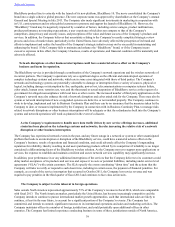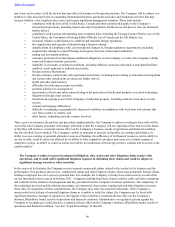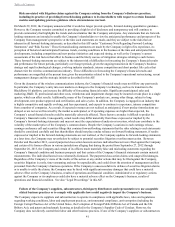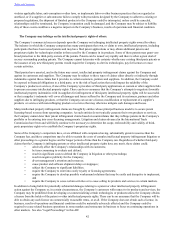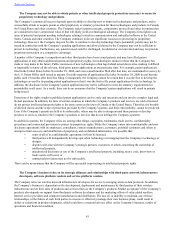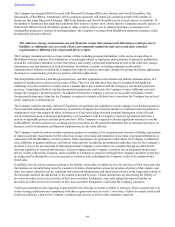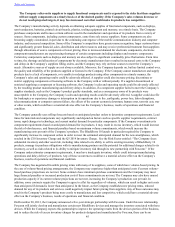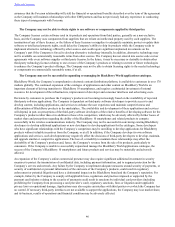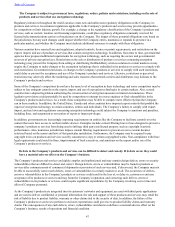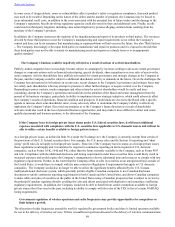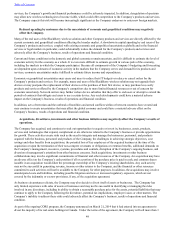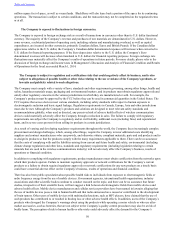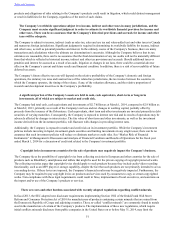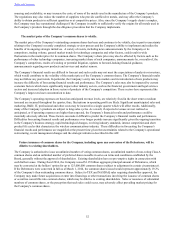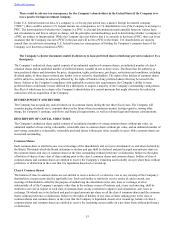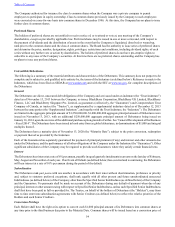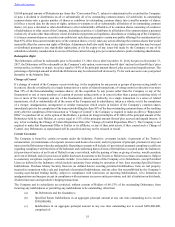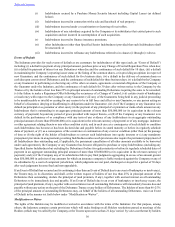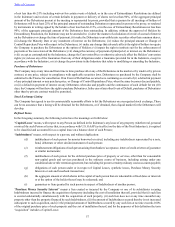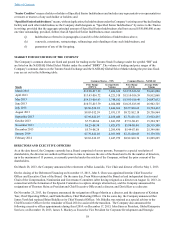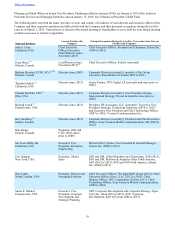Blackberry 2014 Annual Report Download - page 57
Download and view the complete annual report
Please find page 57 of the 2014 Blackberry annual report below. You can navigate through the pages in the report by either clicking on the pages listed below, or by using the keyword search tool below to find specific information within the annual report.
49
services, the Company’s growth and financial performance could be adversely impacted. In addition, deregulation of spectrum
may allow new wireless technologies to become viable, which could offer competition to the Company’s products and services.
The Company expects this risk will become increasingly significant as the Company endeavors to enter new foreign markets.
Reduced spending by customers due to the uncertainty of economic and geopolitical conditions may negatively
affect the Company.
Many of the end users of the BlackBerry wireless solution and other Company products and services are directly affected by the
current economic and geopolitical conditions affecting the broader market. A slowdown in capital spending by end users of the
Company’s products and services, coupled with existing economic and geopolitical uncertainties globally and in the financial
services or legal markets in particular, could substantially reduce the demand for the Company’s products and services and
adversely affect the Company’s business, results of operations and financial condition.
Current and future conditions in the domestic and global economies remain uncertain, and it is difficult to estimate the level of
economic activity for the economy as a whole. It is even more difficult to estimate growth in various parts of the economy,
including the markets in which the Company participates. Because all components of the Company’s budgeting and forecasting
are dependent upon estimates of economic activity in the markets that the Company serves and demand for its products and
services, economic uncertainties make it difficult to estimate future income and expenditures.
Economic or geopolitical uncertainties may cause end users to reduce their IT budgets or reduce or cancel orders for the
Company’s products and services. For example, many end users of the BlackBerry wireless solution may not upgrade their
devices or may postpone the replacement of their devices or the purchase of their first device, or may purchase less costly
products and services offered by the Company’s competitors due to more limited financial resources or out of concern for
economic uncertainty. Network carriers may further reduce device subsidies that they offer to end users or attempt to extend the
periods of contracts that obligate end users to use a certain device. Any such developments could have a material adverse
impact on the Company’s business, results of operations and financial condition.
In addition, acts of terrorism and the outbreak of hostilities and armed conflicts within or between countries have created and
may continue to create uncertainties that may affect the global economy and could have a material adverse effect on the
Company’s business, results of operations and financial condition.
Acquisitions, divestitures, investments and other business initiatives may negatively affect the Company’s results of
operations.
The Company has acquired, and continues to seek out opportunities to acquire or invest in, businesses, assets, products,
services and technologies that expand, complement or are otherwise related to the Company’s business or provide opportunities
for growth. These activities create risks such as the need to integrate and manage the businesses, personnel, and products
acquired with the business, personnel and products of the Company, the challenges in achieving strategic objectives, cost
savings and other benefits from acquisitions, the potential loss of key employees of the acquired business at the time of the
acquisition or upon the termination of their non-compete covenants or obligations or retention benefits, additional demands on
the Company’s management, resources, systems, procedures and controls, disruption of the Company’s ongoing business, and
diversion of management’s attention from other business concerns. Such acquisitions, investments or other business
collaborations may involve significant commitments of financial and other resources of the Company. An acquisition may have
an adverse effect on the Company’s cash position if all or a portion of the purchase price is paid in cash, and common shares
issuable in an acquisition would dilute the percentage ownership of the Company’s existing shareholders. Any such activity
may not be successful in generating revenue, income or other returns to the Company, and the financial or other resources
committed to such activities will not be available to the Company for other purposes. In addition, the acquisitions may involve
unanticipated costs and liabilities, including possible litigation and new or increased regulatory exposure, which are not
covered by the indemnity or escrow provisions, if any, of the acquisition agreement.
As business circumstances dictate, the Company may also decide to divest itself of assets or businesses. The Company has
only limited experience with sales of assets or businesses and may not be successful in identifying or managing the risks
involved in any divestiture, including its ability to obtain a reasonable purchase price for the assets, potential liabilities that may
continue to apply to the Company following the divestiture, potential tax implications, employee issues or other matters. The
Company’s inability to address these risks could adversely affect the Company’s business, results of operations and financial
condition.
As part of the ongoing CORE program, the Company announced on March 21, 2014 that it had entered into an agreement to
divest the majority of its real estate holdings in Canada. Under the terms of the agreement, the Company will sell more than 3
Table of Contents


